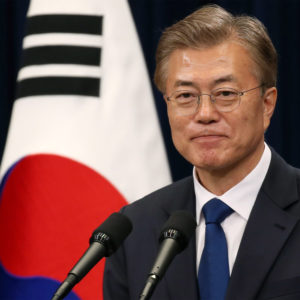The campaign for a successor to South Korea’s President Moon Jae-in promises to be one of the most exciting in the county’s recent history. It will be a referendum on the policies of the previous five years in which the economy has suffered and Moon’s dramatic overtures to North Korea have gone nowhere.
The reaction against Moon is so severe that Yoon Seok-youl, the conservative People Power Party candidate, is favored though he has had no previous experience as a political candidate. Rather, Yoon dedicated his career before seeking the nomination to criminal cases, often against political figures mired in corruption. It’s a tribute to his zeal as a prosecutor that Moon named him prosecutor-general in June 2019 and that Yoon did not hesitate to go after figures in Moon’s government.
For U.S. policy-makers, however, the more immediate question is how to get along with the winner of the election. The U.S. establishment, from the White House to the Pentagon and the State Department, is sure to put on a show of neutrality. Nobody in a position of power and influence in Washington is going to create a sensation in Korea by declaring support for either Yoon or his Democratic or Minjoo Party opponent, Lee Jae-myung, the leftist governor of Gyeonggi Province surrounding the capital of Seoul, a separate entity.
We may be sure, however, that the Americans prefer Yoon to Lee. Yoon might continue the quest for dialog with North Korea, but he has said clearly that denuclearization of the North remains a priority as it’s always been for the U.S. He has also said perhaps the U.S. should deploy nuclear weapons in South Korea as it did before President George H.W. Bush ordered their withdrawal soon after his inauguration in 1989. He clearly believes in the historic U.S.-South Korea alliance.
Yoon’s view on the alliance contrasts starkly with that of Lee going back to his days as the leftist mayor of a city near Seoul. Following in Moon’s footsteps, he would dedicate his efforts to appeasing North Korea, calling for doing away with sanctions imposed by the US and UN. Superficially, he would say North Korea should take corresponding steps, but the North under Kim Jong-un is not going to live up to any such deal.
Lee signaled his anti-alliance outlook several years ago when he called for withdrawal of THAAD, the Terminal High Altitude Area Defense missile complex installed by the U.S. army 200 miles south of Seoul. Needed for defense against high-flying hypersonic missiles that North Korea has been testing, THAAD remains the focal point of leftist protest. As president, Lee could be expected also to oppose joint U.S.-Korea military exercises and to question the need for the alliance.
The Americans will approach Lee gingerly, trying to get him to tone down his more extreme views. The goal would be to preserve the alliance, to ensure that U.S. troops remain in Korea while not jeopardizing the structure of U.S.-Korean relations. The Americans would also have to deal carefully with Yoon, coordinating on approaches to North Korea and the alliance, but could expect understanding of the need for solid defense against the North.
The U.S. and South Korea, under Yoon, want to tie humanitarian aid to North Korea to the North’s showing signs of denuclearization, and they would also want to know where the aid was going. Yoon would almost certainly signal his outlook by a summit with President Biden next Spring soon after the election in March. Lee might not demand the withdrawal of U.S. troops, but he definitely would not want to encourage cooperation while increasing efforts for dialog and reconciliation with the North.
North Korea and the American alliance, however, may not be the pivotal factor in the campaign. Korea’s flagging economy and corruption count for more in everyday Korean politics. Yoon’s essential conservatism comes as a relief to many who are tired of Moon’s unsuccessful attempts at economic reform. Moon’s promise of a “New Deal” to digitize the economy and attack the climate crisis by reducing dependence on oil natural gas is largely forgotten.
Amid disappointments on the economy, Lee Jae-myung has called for universal income, and he’s likely to undermine the system in which huge conglomerates like Samsung and Hyundai Motor have made Korea a global economic power. More importantly, for the U.S. the real fear is he would also undermine if not destroy the U.S.-Korean alliance.

